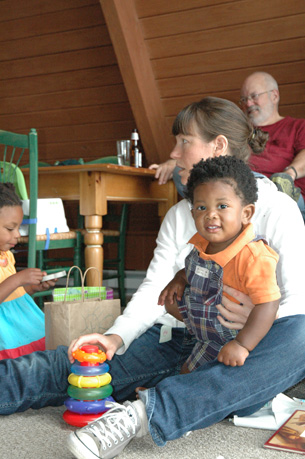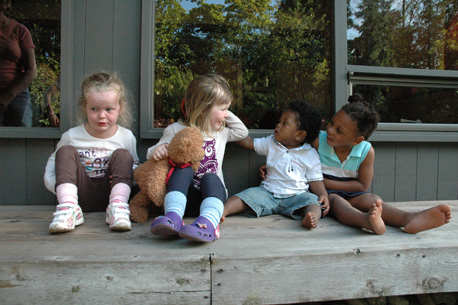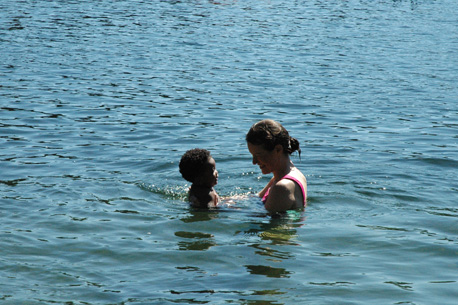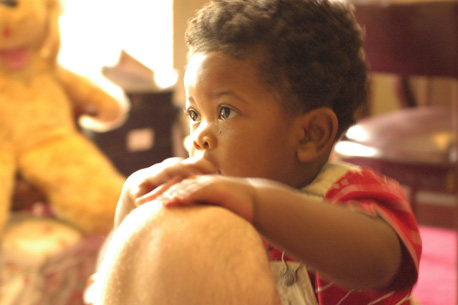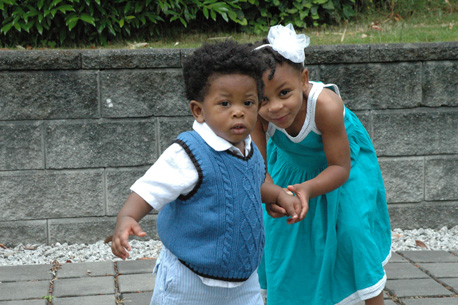 At the end of our first meeting with our eleven-month-old son, when we were all tired from intense emotions and two hours of solid play, our boy started walking around the room jabbering and touching his flat hands to his chest, turning them palms up, and shrugging his shoulders. There was a crowd of stuffed animals near the window and he spoke to them, vehemently, patting his chest then raising his palms. Sometimes it looked like he was clapping for himself. As if to say, how do you like me now? Look at me walk! Other times it was more of a question, like, what? Or what do you think?
At the end of our first meeting with our eleven-month-old son, when we were all tired from intense emotions and two hours of solid play, our boy started walking around the room jabbering and touching his flat hands to his chest, turning them palms up, and shrugging his shoulders. There was a crowd of stuffed animals near the window and he spoke to them, vehemently, patting his chest then raising his palms. Sometimes it looked like he was clapping for himself. As if to say, how do you like me now? Look at me walk! Other times it was more of a question, like, what? Or what do you think?
Now that we’re home, playing with blocks and falling madly in love, our son repeats these moves often and I wonder where these gestures came from. We know very little about the first nine months before he went into the adoption agency’s nursery care. We know his birth mother was not there for him but we do not know much else.
Those first months are an empty book, and I find myself trying to fill the pages, looking for clues to patch together a story – a way to make sense of what happened. It’s becoming clear to me that there was someone, a grandparent, cousin or aunt, at least one person in his life who loved and cared for him. There are telltale signs, the broken hairs along his hairline that may be the result of tight cornrows, the well-fed, ham-hock thighs with creases you can lose fingers into, his affection and willingness to bond. I analyze these movements the same way. I wonder if someone who cared for him used this gesture or something similar. Did they pat their hands to their chest while talking to him? Were they joking with him? Were they dancing?
Maybe this is just me being a mom. Maybe it’s just me not being able to imagine someone not loving this baby. Maybe the thought of him alone in his crib is too much to bear.
Sometimes our boy has trouble going to sleep at night. I usually rock him until he is solidly out and then transfer him to the crib. The other night he fell asleep on my shoulder, then when I transferred him to the crib, he woke up. We started over. We repeated this two or three times. He’d spend minutes sound asleep on my shoulder and just when it was time to transfer, he’d bolt awake and swipe the glasses off my face.
He had every right to his insomnia. He was in another new place with another new set of people, but I was frustrated nonetheless. We’d been rocking for over ninety minutes when, as he squirmed, grabbed and pulled away, I sat him squarely on my thighs, looked him in the eye, and said, “Hey, kid, what is it you want me to do? Just tell me, because clearly what I am doing here is not working for you.” I know, he doesn’t speak, but I was desperate.
He dropped his shoulders, tipped his head down just a bit, touched his hands to his chest and pulled them away, palms upward. This time, the gesture meant, I don’t know. I just don’t know. This kid was even more tired and frustrated than I was.
So I rolled him onto his side, we found a new position, we went back to our rocking and I went back to wondering what his life had been like. Had he been placed into his crib fully awake? Did he even sleep in a crib? I wondered how his caretaker was doing. Gradually, our boy drifted off. Even in sleep, he’d occasionally pat his chest and raise his palms. This time the gesture looked a lot like gratitude.
PS – Who in This Room: The Realities of Cancer, Fish and Demolition ships exactly two weeks from tomorrow. It’s available for pre-order anywhere that books are sold. The time has come!
At the end of our first meeting with our eleven-month-old son, when we were all tired from intense emotions and two hours of solid play, our boy started walking around the room jabbering and touching his flat hands to his chest, turning them palms up, and shrugging his shoulders. There was a crowd of stuffed animals near the window and he spoke to them, vehemently, patting his chest then raising his palms. Sometimes it looked like he was clapping for himself. As if to say, how do you like me now? Look at me walk! Other times it was more of a question, like, what? Or what do you think?
Now that we’re home, playing with blocks and falling madly in love, our son repeats these moves often and I wonder where these gestures came from. We know very little about the first nine months before he went into the adoption agency’s nursery care. We know his birth mother was not there for him but we do not know much else.
Those first months are an empty book, and I find myself trying to fill the pages, looking for clues to patch together a story – a way to make sense of what happened. It’s becoming clear to me that there was someone, a grandparent, cousin or aunt, at least one person in his life who loved and cared for him. There are telltale signs, the broken hairs along his hairline that may be the result of tight cornrows, the well-fed, ham-hock thighs with creases you can lose fingers into, his affection and willingness to bond. I analyze these movements the same way. I wonder if someone who cared for him used this gesture or something similar. Did they pat their hands to their chest while talking to him? Were they joking with him? Were they dancing?
Maybe this is just me being a mom. Maybe it’s just me not being able to imagine someone not loving this baby. Maybe the thought of him alone in his crib is too much to bear.
Sometimes our boy has trouble going to sleep at night. I usually rock him until he is solidly out and then transfer him to the crib. The other night he fell asleep on my shoulder, then when I transferred him to the crib, he woke up. We started over. We repeated this two or three times. He’d spend minutes sound asleep on my shoulder and just when it was time to transfer, he’d bolt awake and swipe the glasses off my face.
He had every right to his insomnia. He was in another new place with another new set of people, but I was frustrated nonetheless. We’d been rocking for over ninety minutes when, as he squirmed, grabbed and pulled away, I sat him squarely on my thighs, looked him in the eye, and said, “Hey, kid, what is it you want me to do? Just tell me, because clearly what I am doing here is not working for you.” I know, he doesn’t speak, but I was desperate.
He dropped his shoulders, tipped his head down just a bit, touched his hands to his chest and pulled them away, palms upward. This time, the gesture meant, I don’t know. I just don’t know. This kid was even more tired and frustrated than I was.
So I rolled him onto his side, we found a new position, we went back to our rocking and I went back to wondering what his life had been like. Had he been placed into his crib fully awake? Did he even sleep in a crib? I wondered how his caretaker was doing. Gradually, our boy drifted off. Even in sleep, he’d occasionally pat his chest and raise his palms. This time the gesture looked a lot like gratitude.
PS – Who in This Room: The Realities of Cancer, Fish and Demolition ships exactly two weeks from tomorrow. It’s available for pre-order anywhere that books are sold. Do it! The time has come!



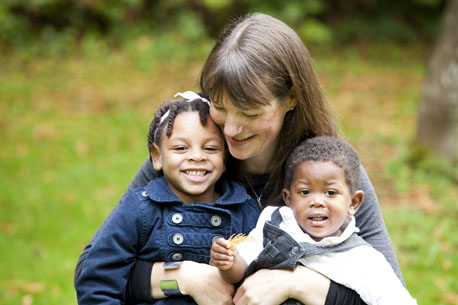
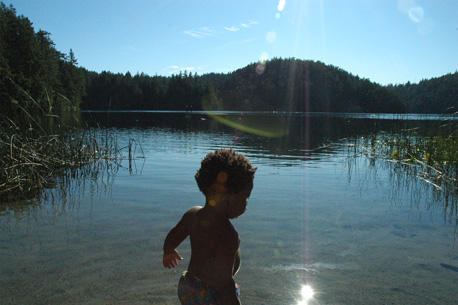

 At the end of our first meeting with our eleven-month-old son, when we were all tired from intense emotions and two hours of solid play, our boy started walking around the room jabbering and touching his flat hands to his chest, turning them palms up, and shrugging his shoulders. There was a crowd of stuffed animals near the window and he spoke to them, vehemently, patting his chest then raising his palms. Sometimes it looked like he was clapping for himself. As if to say, how do you like me now? Look at me walk! Other times it was more of a question, like, what? Or what do you think?
At the end of our first meeting with our eleven-month-old son, when we were all tired from intense emotions and two hours of solid play, our boy started walking around the room jabbering and touching his flat hands to his chest, turning them palms up, and shrugging his shoulders. There was a crowd of stuffed animals near the window and he spoke to them, vehemently, patting his chest then raising his palms. Sometimes it looked like he was clapping for himself. As if to say, how do you like me now? Look at me walk! Other times it was more of a question, like, what? Or what do you think?